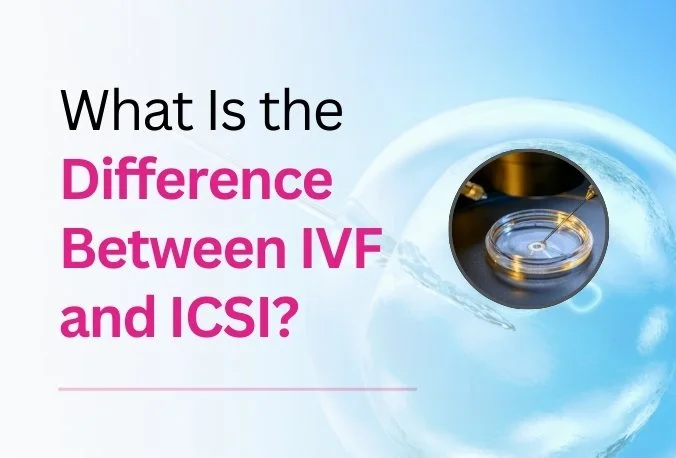What is the difference between IVF and ICSI?
– Published on 08 April 2024

Assisted Reproductive Technologies (ART) have revolutionized the field of reproductive medicine, providing hope and solutions to couples facing fertility challenges. Among these technologies, In Vitro Fertilization (IVF) and Intracytoplasmic Sperm Injection (ICSI) stand out as pivotal procedures.
IVF entails the process of fertilizing an egg with sperm outside the body, in a laboratory setting, while ICSI takes this a step further by injecting a single sperm directly into an egg to facilitate fertilization.
These methods have become cornerstone treatments for infertility, offering rays of hope to many aspiring parents. The purpose of this article is to demystify IVF and ICSI, providing clear insights into each procedure and offering guidance to individuals and couples.
Also Read –IVF comprehensive guide
Fundamentals of IVF Process
The journey through IVF begins with the stimulation of ovaries to encourage the production of multiple eggs. This is achieved through the administration of fertility drugs, which is closely monitored to ensure the optimum development of ovarian follicles.
Subsequently, the egg retrieval stage involves a minor surgical procedure wherein these eggs are extracted from the ovaries using an ultrasound-guided needle, usually under sedation.
Following retrieval, these eggs are combined with sperm in a controlled laboratory environment, marking the process of in vitro fertilization. The sperm naturally fertilizes the eggs, and the fertilized eggs, now called embryos, develop over the course of a few days.
The final step is the embryo transfer to the uterus, where one or more of the best quality embryos are selected and carefully placed into the woman’s uterus, with the hope that implantation will occur, leading to pregnancy.
Deep Dive into ICSI
Intracytoplasmic Sperm Injection (ICSI) is a specialized form of IVF that is particularly beneficial for couples facing severe male infertility issues.
ICSI is an advanced reproductive technology used to enhance the fertilization phase of the IVF process. It is a highly targeted technique that involves injecting a single sperm directly into an egg, overcoming many traditional infertility obstacles.
ICSI addresses male infertility factors, such as low sperm count, poor sperm motility, or abnormally shaped sperm, which might otherwise impede the success of conventional IVF. Additionally, it is the preferred method when sperm must be retrieved directly from the testicles or epididymis due to vasectomy, blockage, or other conditions.
Step-by-step process of ICSI
1. Sperm selection and preparation
The ICSI process begins with the meticulous selection of the highest quality sperm. This involves analyzing a semen sample under a microscope and choosing sperm with the optimal shape and motility. This selected sperm is then prepared through a specialized washing and capacitation protocol to ensure it is capable of fertilizing the egg.
2. Microscopic injection of a single sperm into an egg
Using a fine glass needle, an embryologist performs the delicate procedure of injecting a single sperm into the cytoplasm of the egg. This is done under a microscope in a controlled laboratory setting, greatly increasing the chances of fertilization even in cases of significant male factor infertility.
3. Fertilization and embryo development
After the injection, the egg is monitored closely for signs of fertilization. Once fertilized, the egg begins to divide and develop into an embryo.
4. Embryo transfer
The final step in ICSI is transferring the resulting embryo(s) into the woman’s uterus through a thin catheter inserted through the cervix. This is typically done around three to five days after fertilization, depending on the embryo’s development.
5. Pregnancy test and follow-up
After the embryo transfer, patients must wait about two weeks before taking a pregnancy test to determine if the procedure was successful. If pregnancy occurs, regular check-ups and monitoring will be conducted to ensure the health of both mother and baby.
6. Additional fertility treatments
In some cases, ICSI may be used in conjunction with other fertility treatments such as preimplantation genetic diagnosis (PGD) or egg freezing. PGD involves testing embryos for certain genetic conditions before implantation, while egg freezing allows couples to preserve their fertility for future use.
Key Differences Between IVF and ICSI
Intracytoplasmic sperm injection (ICSI) and in vitro fertilization (IVF) are two of the main assisted reproductive technologies used to help couples facing infertility. While both methods aim to facilitate fertilization outside the body, they differ significantly in procedure and applicability.
Fertilization process variation between IVF and ICSI
IVF typically involves the combination of eggs and a higher concentration of sperm in a laboratory dish, allowing fertilization to occur naturally. Conversely, ICSI is a more direct method where a single sperm is injected directly into the egg.
This targeted approach in ICSI is necessary when the quality or quantity of the sperm is insufficient for conventional IVF, ensuring that fertilization is still achievable even under challenging conditions. Both procedures require careful monitoring to ensure the health and viability of the embryo before implantation.
Situations Favoring ICSI Over Traditional IVF
ICSI is often the method of choice under specific conditions that affect sperm quality or fertilization chances. These conditions include severe male factor infertility, such as
- low sperm count (oligospermia),
- poor sperm motility (asthenozoospermia), or
- abnormal sperm morphology (teratozoospermia).
It is also the preferred technique when past IVF attempts have resulted in poor fertilization rates or if the sperm must be retrieved surgically from the testicles or epididymis — a procedure known as testicular sperm extraction (TESE). For couples with a history of genetic disorders, ICSI is utilized alongside PGD to decrease the risk of transmitting the condition to the baby.
Comparing Success Rates and Considerations for IVF and ICSI
While IVF and ICSI both aim to achieve pregnancy through assisted reproductive technology, their success rates can vary based on numerous factors.
Statistically, IVF success rates are influenced by the woman’s age, the fertility issue at hand, and the overall health of the individuals involved.
ICSI, while offering hope in cases of severe male infertility, has similar dependencies and also carries a slightly increased risk of certain genetic and development issues due to the direct sperm injection process.
It is worth noting that the success of both methods is also contingent on the quality of the laboratory environment and the skill of the embryologists. With continuous advancements and refinement in techniques, both IVF and ICSI continue to present viable routes to parenthood for couples facing fertility challenges.
Choosing the Right Option: IVF or ICSI?
When deliberating between IVF and ICSI, several factors should be taken into consideration to tailor the fertility treatment to the couple’s specific circumstances.
Critical factors include the severity and type of male infertility, previous IVF cycles and their outcomes, as well as any known genetic concerns that might affect the child.
Additionally, the couple’s personal preferences, financial constraints, and ethical considerations about assisted reproductive technologies play a significant role in the decision-making process.
Expert advice from a fertility specialist is of utmost importance in assessing these factors and determining the most appropriate treatment pathway.
Medical conditions that might guide the decision-making process
Certain medical conditions can significantly influence the decision-making process when selecting between IVF and ICSI. For instance, if a man has an extremely low sperm count, known as oligospermia, or issues with sperm motility or morphology, ICSI may be the recommended course of action.
Likewise, if there is a history of fertilization failure with standard IVF, or if a couple needs to use sperm retrieved directly from the testicles or epididymis (as in cases of obstructive azoospermia), ICSI stands out as the preferential option.
In contrast, for women with ovulatory disorders, diminished ovarian reserve, or uterine abnormalities, the choice between IVF and ICSI will largely depend on sperm quality rather than female factors.
It is crucial for any underlying issues to be accurately diagnosed by a specialist to optimize the treatment strategy.
In conclusion, couples must be well-informed and make decisions tailored to their unique situations. Consulting expert IVF specialists, who are adept at navigating the intricacies of conditions like oligospermia or azoospermia, is invaluable in this process.

By Dr Samidha Dalvi-Amale
IVF and Fertility specialist Medical Director- Pune IVF
